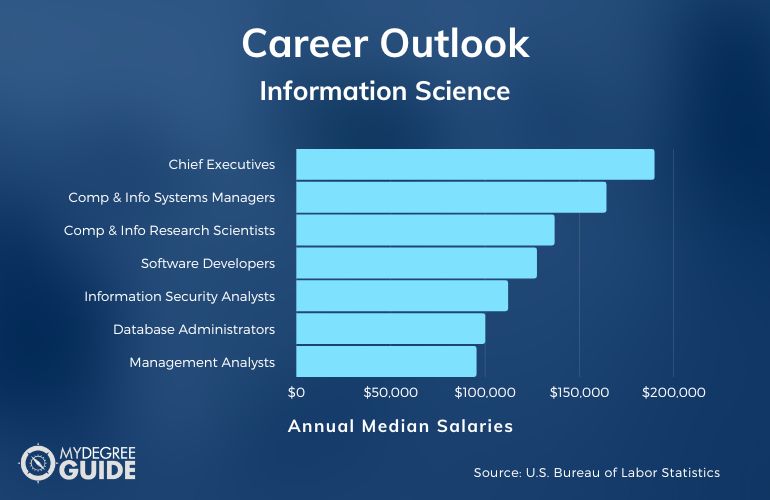If you want to become a leader in information technology and systems, then now may be the time to go to school for a masters in information science.

This degree program will teach you to use technology for organizing, sharing, and retrieving information. You can acquire skills for developing the information systems that modern organizations need.
Editorial Listing ShortCode:
When you’re ready to take the next step in your information career, an online degree in information science can help you work toward your goals.
Universities Offering Online Masters in Information Science Degree Programs
Methodology: The following school list is in alphabetical order. To be included, a college or university must be regionally accredited and offer degree programs online or in a hybrid format.
Marquette University
Marquette University offers an MS in Computer and Information Science online. Concentrations include IT Management, Analytics/AI, and Solutions Architecture/Software and Systems Development. The program has multiple start dates throughout the year. On average, the coursework can be completed in 2 years.
Marquette is accredited by the Higher Learning Commission.
Pennsylvania State University
Pennsylvania State University offers the opportunity to earn a Master of Science in Information Science degree completely online. The program requires 33 credits. Potential courses include Web Security and Privacy, Information Science Emerging Topics, and Business Process Management and Integration.
Penn State is accredited by the Middle States Commission on Higher Education.
Syracuse University
An MS in Information Systems can be earned online through Syracuse University. The program provides flexibility and opportunities for collaborative learning. The curriculum covers various topics including how to help businesses organize both small and large datasets and how to gain insights from data to inform decision-making.
Syracuse University is accredited by the Middle States Commission on Higher Education.
Temple University
Temple University offers a flexible online Master’s in Information Science and Technology. The program is highly interactive and allows for on-campus learning as well. Concentrations include Software Quality Assurance, Mobile Computing, DevOps, and Data Analytics. Applications are accepted on a rolling basis.
Temple University is accredited by the Middle States Commission on Higher Education.
Texas A&M International University
Texas A&M International University offers a fully online MS in Information Science. The program requires 33 credits and can typically be completed in 1 year. Potential courses include Seminar in Management Concepts, Networks and Distributed Systems, and Database Management and Design.
Texas A&M International University is accredited by the Southern Association of Colleges and Schools Commission on Colleges.
University at Albany
A Master of Science in Information Science can be earned through the University at Albany either online or on campus. The program features a 150-hour internship to gain real-world experience. Potential courses include Administration of Information Agencies, Information and Knowledge Organization, and The Information Environment.
UAlbany is accredited by the Middle States Commission on Higher Education.
University of Arkansas – Little Rock
The University of Arkansas – Little Rock’s Information Science MS offers theory and hands-on skills using current technology. Courses are online and use live webcasts. Potential courses include Information Visualization, Artificial Intelligence, and Data Science and Technologies.
UA Little Rock is accredited by the Higher Learning Commission.
University of North Texas
The University of North Texas offers the opportunity to earn a Master of Science in Information Science online. The program requires 36 credits. Various specializations are available including Knowledge Management, Information Systems, Information Organization, Health Informatics, and Archival Studies.
The University of North Texas is accredited by the Southern Association of Colleges and Schools Commission on Colleges.
University of Tennessee – Knoxville
The University of Tennessee – Knoxville offers an MS in Information Science online. Depending on preferences, 3 of the core classes are available on campus. Online courses are designed to provide real-time interactions with an engaging community. Graduates may apply for positions in a variety of fields, including library services and technology.
The University of Tennessee – Knoxville is accredited by the Southern Association of Colleges and Schools Commission on Colleges.
University of Wisconsin – Milwaukee
The University of Wisconsin – Milwaukee offers an MS in Information Science and Technology online, on campus, or in a hybrid format. The program requires 30 credits. Potential courses include Survey of Information Security, Computing Fundamentals for IT Professionals, and Software Development Life Cycle.
UWM is accredited by the Higher Learning Commission.
Online Masters in Information Science Programs

Today’s organizations have a lot of data and information at hand. They need ways to manage that information and make good use of it.
As a professional in the information science industry, you may be responsible for developing or managing systems used for storing, organizing, retrieving, sharing, or analyzing data. Your work may involve proprietary information systems that are relevant to your specific organization or industry.
Graduate studies in information science are usually Master of Science (MS) degrees. Some schools pair information science programs with studies in computer science or library science.
Information science studies vary from one school to another, but yours might cover:
- Computer programming
- Data analytics
- Database development and administration
- Information security
- Networks
- Project management
- Quality assurance
- Software and web development
- User experience
In addition, you’re likely to learn leadership skills that can help as you advance in your career. Your degree may have a specific emphasis. Perhaps you’ll focus on archival imaging, bioinformatics, librarianship, or digital forensics. If so, you’ll take a series of courses dealing with that area of study.
In addition to taking an assortment of classes, you might also be interested in gaining hands-on experience. Some online programs allow you to complete an internship as part of your program. You might be able to get college credit for your field experience.
To wrap up your information science program, you might be required to complete a capstone research project or write a master’s thesis. Some schools may require you to pass comprehensive exams as well. Once you complete your information science degree, you might consider work as a database administrator, a software engineer, or a web developer.
Information systems management roles might be available as well. Some information science professionals head up a team that deals with electronic healthcare records or builds user-friendly web databases. Alternatively, some graduates become information science researchers.
Common Online Masters in Information Science Concentrations

Information science professionals can work in many different settings, including healthcare facilities and libraries. You might want to select a degree concentration that can help prepare you for a specific branch of this field.
Here are some common information science concentrations:
- Archives. Focusing on archival techniques and imaging systems could help prepare you for careers in library, museum, or archive settings.
- Data Organization and Storage. You might choose a concentration that covers databases, web-based information systems, library cataloging, and other topics related to managing data.
- Geoinformatics. You can become an expert in geographic information systems (GIS) and spatial databases as you take courses in geospatial analysis and data structures.
- Information System Security. Through classes in networking, digital forensics, and data mining, you can learn more about what’s involved in protecting data.
- Healthcare Informatics. If you plan to work in medical research or with electronic health records (EHR), then you may appreciate this concentration’s focus on health data.
The above concentrations are examples, but your college may have an assortment of other specializations available for the information science degree.
Information Science Careers & Salaries

As a professional in the information science sector, there may be many different jobs that you can do. Many people become software developers or software engineers.
Related roles could include becoming a user experience (UX) designer, a web developer, or an application developer. You might also be able to work as a project manager for a software development team. Information science professionals also know about database technology.
Potential jobs might include being a database administrator or a database architect. Some information professionals specialize in system security. They might work as security analysts who make sure that data storage systems will keep information secure.
According to the Bureau of Labor Statistics, many potential information science careers belong to the computer, IT, and mathematics sector. The median annual salary in that sector is $100,440.
| Careers | Annual Median Salaries |
| Chief Executives | $189,520 |
| Computer and Information Systems Managers | $164,070 |
| Computer and Information Research Scientists | $136,620 |
| Software Developers | $127,260 |
| Information Security Analysts | $112,000 |
| Database Administrators | $99,890 |
| Management Analysts | $95,290 |
| Web Developers | $78,580 |
| Librarians and Media Collections Specialists | $61,660 |
| Health Information Technologists and Medical Registrars | $58,250 |
For some of these career opportunities, you may want to choose a specific concentration for your information science degree.
Completing a master’s degree in information science or a masters in technology management online might look good on your resume when applying for leadership roles. Some graduates go on to become information technology or information systems managers. Others even get to work as a chief information officer (CIO). Alternatively, you could consider research roles. Information research scientists often work for the federal government or computer companies.
Some information science graduates use their skills for specific industries. For example, they might work as librarians or archivists. Others are involved in healthcare informatics. There are also positions for experts in geographic information systems and for management analysts who help businesses improve their teams and practices.
Master of Information Science Curriculum & Courses

Information science students often have a diverse selection of courses from which they can select. Here are some course examples:
- Data Analytics: You can learn to conduct data mining, create models, and analyze data to help with an organization’s decision-making processes.
- Database Skills: This class will teach you how to design a database, keep the information safe, and provide continuing database management.
- Ethics in Information Science: As you study the ethical implications of data management, you may read case studies and engage in discussions with your classmates.
- Information Science Leadership: In a class on leadership, you can learn management skills, discuss building teams, and talk about the principles of decision-making.
- Information Security in Business: You might learn about protecting networks, keeping business information secret, safeguarding employees’ data, and establishing policies for information security.
- Leadership in Project Management: This class can help prepare you to oversee projects, including the preparatory, launch, and evaluation stages.
- Network Technology: There might be a class in network hardware, wireless systems, the internet, and other concepts relevant to connecting computers and people with one another.
- Records Management: You may learn to sort through past documents and data, organize the information, and store it for future use.
- Scripting and Programming: You will work with scripting and programming languages that can be useful in business settings.
- Usability Principles: This class will focus on building information systems that not only accomplish their intended goals but are also easy for people to use.
There are usually some core courses required for an information science program, but you may get to choose electives that are related to your interest areas as well.
Admissions Requirements

What documentation you’ll need for admission to a graduate program can vary from school to school. Common requirements include:
- Online application form and fee
- Recommendation letters or resume to show professional accomplishments
- GRE or GMAT scores (not required at all colleges)
- Personal essay about your purpose for enrolling and your professional goals
- Transcripts indicating the completion of a bachelor’s with a minimum GPA (often 3.0)
Some schools also request an interview with candidates for admission.
Accreditation

Regional accreditation is a status that’s granted to schools that achieve commonly accepted standards for educational institutions.
If you choose an accredited school, you can feel confident that you’re going to get a quality education. That goes for both online and campus-based programs. Other schools will know it too. You may be able to transfer accredited coursework between colleges or qualify for a doctoral program.
Employers, as well, may be pleased to see that you have attended a regionally accredited college. Many workplaces consider accredited degrees more trustworthy than unaccredited ones.
Financial Aid and Scholarships

If you need assistance covering the upfront costs of information science graduate school, you can take a look at the financial aid opportunities that may be available to you.
Graduate students who qualify can receive state and federal loans. In some cases, they may be eligible for government grants as well. To learn about your eligibility for government tuition assistance, you can complete the Free Application for Federal Student Aid (FAFSA).
Your school may have scholarship money to distribute to information science students. You may be automatically considered for those awards, or you may submit an application. There are outside scholarships, such as programs run by industry organizations, for which you may qualify as well.
If you’re currently working, your employer might be willing to pay for part of your tuition too.
What Is a Master’s Degree in Information Science?

A master’s degree in information science is a graduate program for people who are interested in information technology and systems.
People who earn this degree are usually interested in building useful information systems and deploying them to help organizations achieve their goals. They deal with systems not only for organizing data but also for information analysis and retrieval.
The courses for this degree program may cover databases, programming, user experience, and networking. Some classes may focus on information systems for specific industries, such as healthcare, libraries, financial institutions, or schools.
What Can You Do with a Masters in Information Science?

Earning a master’s degree in information science could help prepare you for a variety of exciting jobs in growing fields.
Examples of top career choices include being a database administrator, a software developer, a health informatics director, or a management consultant. Some people work in user experience, librarianship, or web development. A graduate degree may also help you grow your earning potential and job qualifications.
Professionals with experience may pursue management opportunities, such as computer or information systems managers.
How Long Does It Take to Get an Information Science Masters Degree Online?

Some full-time information science students can complete a masters degree in just 1 year. In many programs, though, it may take closer to 2 years. If you want to complete your degree in short order, you can look for a program that requires 36 credit hours or less. You may also want one that doesn’t involve writing a thesis.
Online schools often have the advantage of using a fast-track format that helps students get through grad school quickly. This can involve classes that last just 7 weeks to 10 weeks each. Another benefit of online programs is that the classes are often offered year-round.
What’s the Difference Between a Master of Science in Information Science vs. Computer Science?
For a career in information technology, you could think about getting your degree in information science or computer science.
| MS in Information Science | MS in Computer Science |
|
|
Some schools offer a degree in computer information systems, which may combine concepts from both fields.
Is a Masters in Information Science Worth It?

Yes, a masters in information science is worth it for many students. This degree program is highly relevant to today’s businesses. In an information science program, you can learn essential skills for developing information systems that will help organizations make good use of their data.
The job growth rates for relevant careers show just how in-demand information science experts are. The Bureau of Labor Statistics projects that jobs for computer and information systems managers will increase by 16% over the next ten years. Roles for computer and information research scientists may grow at a 21% rate.
Getting Your Master in Information Science Online

If you are interested in learning more about information systems and information technology, then getting a graduate degree in information science could be a strategic choice. An information technology online degree program could help enhance your current career or help you break into a new field.
With experience and a masters, you may become eligible for promotions to information systems management positions. To balance grad school and your other responsibilities, you might take a look at the benefits of getting a degree online. You can get a high-quality online education from an accredited university.
You can start exploring the personal and professional benefits of an information science online degree program today.
